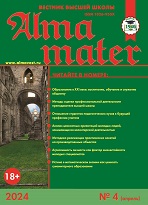UDC 378:32:316.6
https://doi.org/10.20339/AM.09-21.033
V.V. Zagrebin is PhD (Sociology), Ass. Prof. e-mail: zagrebin_vladimir@mail.ru; and E.S. Kalinin is Student of Department of Sociology e-mail: ronnval96@gmail.com at P.G. Demidov Yaroslavl State University
Presented is the study of the role of the academic environment in the formation of political attitudes of modern Russian students on the example of the city of Yaroslavl. The theoretical interpretation of the political attitude is presented. The definition of political attitudes, structure, typology and functions are disclosed. The material presented in the article is based on the results of the author's sociological study of the political attitudes of students, primarily through the study of the university environment as a factor in the formation of political attitudes. The political involvement of students, their protest moods, electoral behavior, political views, trust in political institutions and leaders, popular sources of political information among students, social activity and other aspects are analyzed. The results of the study showed that the influence of the academic environment on the political attitudes of students is rather moderate. It was found that academic performance, the level of student social activity, the faculty of education do not have a significant impact on the political orientations of students. Communication with other students and teachers is essential. Moreover, the influence of teachers and disciplines of a socio-political orientation rather leads to an increase in political literacy and greater involvement of students in the political sphere.
Key words: political attitudes, political socialization, youth.
References
1. Kiselev named Russian education “conveyer of social dissatisfied”. RBK, 05.11.2019. URL: https://www.rbc.ru/society/05/11/2019/5dc152179a7947bfd958548e (accessed on: 20.07.2021).
2. Pogorely, D.E., Fesenko, V.Yu., Filippov, K.V. Politology dictionary-reference book. Rostov n/D: OOO “Nauka-spektr”, 2008. 320 p.
3. Malkevich, A.A. Politic socialization: basic theoretical approaches. In: Society. Environment. Development (Terra Humana). 2010. No. 2. P. 83–87.
4. Dobryaev, P.A. Student youth as subject of political process: theoretic-methodological aspect: Abstr. diss. … kand. filosof. nauk: 23.00.03. Minsk, 1993. 18 p.
5. Artemov, G.P. Co-evolution of political regulations and political institutions. In: Vestnik Sankt-Peterburgskogo universiteta. Politologiya. Mezhdunarodnye otnosheniya. 2008. No. 4. P. 9–20.
6. Almond, G., Verba, S. Civil culture: political regulations and democracy in five countries. Moscow: Mysl, 2014. 500 p.
7. Diligensky, G.G. Social political psychology. Moscow: Nauka, 1994. 304 p.
8. Voat, A.A. The role of political regulations in the process of stereotypes in formation of mass consciousness. In: Istoricheskie, filosofskie, politicheskie Iyuridicheskie nauki, kul’turologiya i iskusstvovedenie. Voprosy teorii i praktiki. 2010. No. 1. P. 45–47.
9. Official site of Yaroslavl state university im. P.G. Demidova. URL: https://www.uniyar.ac.ru/sveden/document/ (accessed on: 19.07.2021).
10. Origins of information: internet. FOM. 10.02.2021. URL: https://fom.ru/SMI-i-internet/14538 (accessed on: 20.07.2021).











.png)






